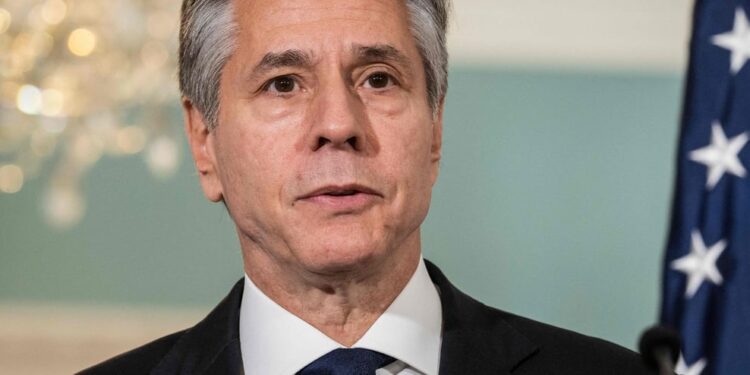US Secretary of State Antony Blinken will visit sub-Saharan Africa next week for the first time in ten months, the State Department announced Thursday, keen to counter the advances of Russia and China on the continent. .
After four frenetic tours of the Middle East since the war broke out on October 7 after the Hamas attack on Israel, Mr. Blinken will head to Africa and will visit Cape Verde, the Coast of Ivory, Nigeria and Angola.
Mr. Blinken will talk about economic growth and how to “advance security partnerships based on shared values such as respect for human rights, the promotion of democracy and the extension of the rule of law”, a State Department spokesperson Matthew Miller said in a statement.
This will be his fourth trip to Africa since taking office.
During his last visit to sub-Saharan Africa, Mr. Blinken became the highest American official to visit Niger, in the hope of defending this fragile democracy, which is also a country on the front line in the fight against jihadists in Sahel.
Four months later, in July, the military deposed the elected president, Mohamed Bazoum. And Niger has since moved closer to Russia, particularly in terms of military cooperation.
Russia is, through the Wagner mercenary group, also active in Mali, the Central African Republic and presumably in Burkina Faso.
Speaking to reporters Thursday, Undersecretary of State for Africa Molly Phee, who visited Niger in December, warned that country against following Mali’s path.
“It’s not a model I would want to follow,” she said. “We have a proven track record there, and they are well aware of that, and we hope they make the right decision.”
Mr. Blinken’s visit will come in the wake of that of Chinese Foreign Minister Wang Yi who visited Ivory Coast on Wednesday, the last stop of an African tour which took him to Egypt, Tunisia and in Togo.
Washington considers Beijing its main strategic rival and presents itself as a better partner for Africa than China, which finances large infrastructure projects with loans.
Football game
The United States hosted a summit of African leaders in Washington in December 2022 promising to invest more in the continent and President Joe Biden said he wanted to go there in 2023, which he did not do.
Such a trip now seems unlikely in this election year in the United States.
The last visit by an American president to Africa dates back to 2015, when Barack Obama visited Kenya and Ethiopia.
In Abidjan, where he will hold talks with President Alassane Ouattara, Mr. Blinken will do a bit of “football diplomacy” by attending a match when Ivory Coast hosts the 34th African Cup of Nations.
In Nigeria, Africa’s largest economy and seat of the Economic Community of West African States (ECOWAS), Mr. Blinken will travel to Abuja to meet President Bola Ahmed Tinubu, then to the immense metropolis of Lagos.
As for the stage in Angola, a major oil producer, the United States is seeking to develop its activities there.
President Biden hailed in November a partnership between the two countries “more important than ever”, after receiving his counterpart Joao Lourenço at the White House.
The United States has particularly invested in the “Lobito Corridor”, a major infrastructure project linking the Democratic Republic of Congo and Zambia via the port of Lobito in Angola.
Angola’s recent withdrawal from the Organization of the Petroleum Exporting Countries (OPEC), amid disagreement over oil production quotas, is also expected to be discussed, as are Angola’s efforts to end the conflict in eastern Democratic Republic of Congo.
“There are short-term issues but it’s a long-term investment” for the United States, underlines Mark Green, former United States ambassador to Tanzania and who directs the Wilson Center, a think tank in Washington. .



